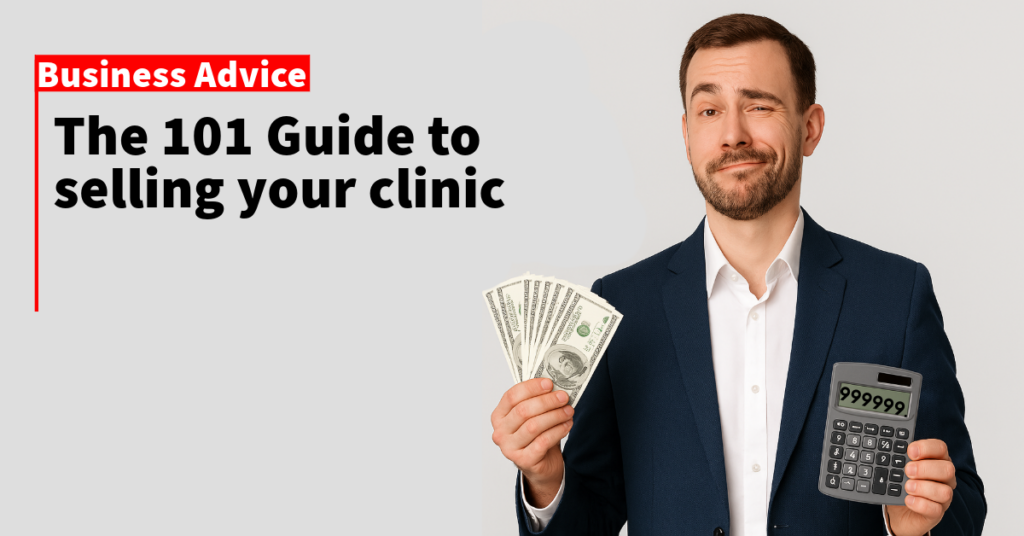You want to sell your clinic? That is exciting. Or terrifying. Or confusing. Or all of the above. The goal of this article is to give you an overview of what to expect. It should give you a good indication on how to best prepare for the sale, avoid some of the pitfalls that clinic owners fall into and get the best possible outcome for a business that you have worked tirelessly on for years.
At HMDG, we want our clients to win and we put this together to help you think about how to succeed with your clinic sale.
Preparing for the sale
Define your goals
So, you’re considering selling your clinic. The first question to ask yourself is: Why? Seriously—what’s driving this decision? Are you done with the daily grind and ready for a new adventure? Dreaming of retirement and long, lazy mornings with coffee that’s still hot? Or do you still love the business but want someone else to take the reins while you focus on the parts you enjoy? Whatever your reason, own it. It’ll shape everything that comes next.
Now, fast forward—what does life look like after the sale? Are you still popping into the clinic a few days a week, or are you sipping cocktails on a beach with zero emails to answer? If you’re staying involved, what parts of the job do you actually want to keep? More importantly, what are you absolutely done with? Setting these boundaries now will save you headaches later. Be clear about the timeframe you are willing to still be involved in the business post sale. Sometimes this might be linked to the payout structure – be aware of terms that tie you in for a certain period of time and terms that are linked to the future profitability of the business that you may not have 100% control over.
Then there’s the big question: What do you actually care about when it comes to the future of your clinic? Do you want the new owner to keep your team happy and the culture intact? Does it matter if they change the name? What if they take the business in a completely new direction? You won’t have control over everything, but knowing your non-negotiables will help you find the right buyer and avoid regret.
And let’s talk about timing. If you’re thinking, “I’d love to sell in the next six months,” you might be very overly optimistic. That’s fast—unless you’ve already done a lot of prep work. A more realistic timeline (at least a year) gives you room to get your business in top shape, attract serious buyers, and negotiate from a position of strength. Ideally you would like to have three years of solid accounts.
The bottom line? Selling your clinic isn’t just a transaction—it’s a transition. The better you plan now, the smoother (and more profitable) it’ll be. Let’s dive into how to make it happen. (See ‘Work Backwards’ below.)
Get advice early
Chances are that you have never sold a business before (and that is OK!). However, you would be stupid not to ask advice of people who have done it before you. You should talk to a relevant accountant early. Be careful, not all of them have experience working on business sales. You should definitely check their experience in that space. They will be able to tell you more about the tax implications of selling your business.
You might also want to think about working with an advisor (ie. a broker). They are expert in the topic and can help you market your clinic to relevant buyers. They will also be able to help you with the negotiation throughout the process. Make sure they have experience in the healthcare space and have successfully worked on some similar deals. Ask for references.
⚠️Warning: be careful about what you sign with any intermediaries. Some advisors will sell you the dream and will lock you on some egregious (and legally binding) terms. It is really worth running any agreement with an advisor past a solicitor before you sign.
You would not sell your house without talking to a few experts. Same goes for your business!
Work backwards
Selling your business might be the most important transaction of your life. You can decide to wing it but that is probably not going to be the best way to maximise your proceeds. To secure the good outcome you deserve, think about it early and work on it in advance.
Think about it like selling a house. You will get a higher price for it if the paint is recent, the bathrooms and kitchen are pristine and the backyard is well maintained. Well, it is not too dissimilar for your business. You need to make it look attractive to buyers. Your business probably needs a bit of work to achieve the amount that you would like to secure. That is OK, it just takes a bit of time and focus.
Here are some of the most important things that you need to have to maximise your chances of success (and financial outcomes):
- Finances in order: it will show that you are on top of things and that potential buyers can “trust” your numbers. It will also avoid bad surprises where you might think that your profit is X (see below “How much is your business worth?” section) when it is actually lower because your forgot to account for PAYE payments or any other costs!
- Practice management software: setting up and using a practice management software should be a priority. This will allow you be on top your Key Performance Indicators and to impress potential buyers. They are going to ask for a ton of metrics about your business, so be prepared for it!
- Sustainable and repeatable patient acquisition: if your main patient acquisition channels are “word of mouth” or “our reputation with local consultants”, this might be a huge problems for potential buyers, especially if you are looking to leave post-sale. Having predictable and diversified marketing channels will help buyers be much more confident about your business’ trajectory after you leave.
- Staff and HR: during the diligence process, buyers will want to see there are no skeletons in the closet on the HR side. Having clear contracts with your staff and having any HR-related issues ironed out before the process is essential. Don’t let some unresolved staff-related issues spook away potential buyers.
- Reduce the share of revenue you generate personally: this might not be the case in all scenarios but generally, the less the business is relying on you to generate revenue, the better. Senior staff clinical hours are the toughest ones to replace. Potential buyers will want to buy a business that runs without you carrying it on your shoulders! You also want to make sure that you don’t have a particular team member that generates the bulk of your revenue
- Gradually reduce the “personal” expenses made on the business: cleaner financials are going to a) help the potential buyer have trust and confidence in your financials and b) simplify the “adjustments” that any buyer will want to do to reflect what the business truly earns. It is perfectly fine to have some legitimate costs on the business (company car, laptop,…) but it might be time to stop shopping on Amazon with that company card!
Think about it like your wedding day. You want to look the best on that day. You might want to shed a few extra pounds before then! Same thing here. Show that your operations are best in class. It will help you attract buyers and secure a higher valuation for your business.
As a general rule, don’t hide anything. It will come out and when it does, it might break any trust and goodwill that you have built with the buyer. If there are any problematic items, own them and give explanations/mitigation plan. If you think the thing you are hiding will repel any potential buyer, then it might not the time for your to sell your business. You might want to address this issue first. You might not want to disclose it in the very first conversation but be very careful about last minute revelations that might scare away potential buyers and leave you high and dry with accountants and lawyer fees!
Remember that your buyers know much less about the business (and sometimes about the industry) than you do. They can easily get scared (and they will). Make sure you don’t have any sacred cows in your business – where a particular person, perhaps your practice manager, holds all the information of processes, passwords, industry knowledge etc.
How much is your business worth?
There are no definitive answers and you should be careful about anyone who says that they have ones. They will have estimations, at best. However, there are general rules on how to estimate the value of your business.
General method
Buyers will generally use the “multiple” valuation method. In other words, they will apply a set multiple on pre-tax profit (also known as “EBITDA” or “Earnings before Interest, Tax, Depreciation and Amortisation). Essentially, what this means is that a buyer will look at how much profit your business is generating before any interest or taxes are paid. Some businesses will have debt and others will have different tax set ups, that is why looking at this “EBITDA” metric allows us to compare business “apple to apple”. If a business generates £100K in EBITDA, the buyer might apply a 2.5x-3x multiple on this business (see below for more on multiple). The business would be worth £250K-£300K.
In order to do that, a buyer will “adjust” your pre-tax profit to reflect what the business would look like after the sale. These adjustments could increase or decrease your profit. Here are some examples
- You have been paying yourself minimum wage and taking dividends. The buyer will adjust the profit for a “market rate” compensation. They will allocate the cost that they would have to pay someone to deliver your clinical work and possibly any other tasks you do. This might reduce what they think is the “real profit” of the business.
- If you started to read this article to have a definitive formula to calculate how much your business is worth, this is the part where I break your heart. That formula does not exist. Even worse, different buyers might have very different valuations for your business and none of them are right (or wrong).
- You have been paying a “higher than market” salary to your significant other who manages the clinic’s operations. Adjusting this cost to the real “market rate” could actually increase the profitability of your business.
- A buyer might want to discount some of the revenue. Do you have large NHS or corporate contracts expiring? Do you generate a lot of revenue from specialised treatments that the clinic will no longer offer when you are gone? The buyers might look at it as revenue (and profit) that will not be there after the sale.
Once they have calculated the “true profit” (also called “adjusted EBITDA” or “clean EBITDA”), they will apply a multiple on it to calculate the value of your business. The multiples can vary widely but generally a clinic will go for ≈3-7x EBITDA (or more). Generally, the bigger the profit, the higher the multiple. But there are other elements that impact how a buyers assesses which multiple to apply.
It is not that simple
There are multiple different factors that might impact how a potential buyer will see your business and different buyers might see it differently. Here are a few characteristics that buyers will take into account. If your business checks some of these boxes, make sure to highlight these in the initial conversations with buyers:
- Growth: is your business growing? If so, next year’s profit are likely to be higher than this year’s. That should make buyers more comfortable to pay more for your business!
- Revenue mix: how do you generate revenue? Are you mostly taking care of private patients, insurance patients or working on NHS referrals? Generally, clinics working with private patients are likely to command a higher valuation.
- Number of hours that you do: we touched on it earlier. Are you the business? Are you the main revenue contributor or are you barely generating any revenue? A clinic with a strong team in place is likely to secure a higher valuation.
- Operations and processes: if your business runs without you needing to be there, it will likely run without the buyer having to do much. That is worth paying a higher price for!
- Niched business: are you highly specialised and working in a niche? Some niche clinics can get valued very highly if the buyer is really looking for targets in that specific sector and if there are not a lot of quality targets in that space. You are a unicorn!
There are multiple other factors that will impact how much a potential will be ready to pay for your business, it is your job to identify those and make sure you highlight them in the process. As a side note, “we have X,000 marketing contacts in our mailing list” is not one of them. I keep seeing these on about 80% of the opportunities I look at and I could not care less. If they have value (ie. could be turned into patients), then surely you would be doing that already. If not, then they are probably old and unqualified leads. Anyway, rant over.
Your outcome beyond the valuation
Now that you have a sense of how much your business could be worth, you will fight hard to get what (you think) you deserve and negotiate with the buyers.
In my experience, there are other variables that can help you find a common ground with buyers if you disagree on the overall amount. The valuation is not an end in itself. There are a lot of factors that you can play with that will help bridge any gap in valuation between you and a buyer and here are some of them:
- Employment post-close: do you want to stay or leave post-close? Staying on board could remove some risk for the buyer and thus make them more comfortable paying a bit more.
- Earn-outs: if you are staying on board and are incentivised on the business perfromance, do you want the incentives to be guaranteed (ie. they can’t go below a certain level) or not? If you are OK with bearing some of the risk, the buyer should pay for that!
- Deferred consideration: you will likely not receive the total amount on day 1. The more you are happy to defer or give some payment facilities to the buyer (and earn some interest on it), the higher the total amount should be.
- Equity rollover: if the buyers are a group or a larger entity, they might offer some of the total amount as shares in the larger structure/the group. Are you comfortable with that? If so, you might be able to secure a larger total amount.
Generally, the more “risk” you are OK to take, the higher the overall package will be. This is the classic rule of “risk/reward”. However, be very clear with yourself on what you are comfortable with and what your redlines are. This is your life’s work, you need to take calculated risks!
Different buyers will look at different things
Generally, you will find that there are 2 types of buyers. They can have different views about your business, what it is worth and where they want to take it going forward:
- Strategic buyers: generally buying a business that helps them develop strategically. By acquiring you they might want to cover a new region, acquire staff/specialisation, grow without opening new clinics from the ground up, diversify their portfolio of clinics,…
- Financial buyers: generally looking to acquire the cash flows of a business and grow these. Think about it like buying an ATM. They will generally want to retain the existing management or put a manager in place to run the business on their behalf.
Some will say this is oversimplified, and they will be right. However, it is still a helpful way to think about your potential buyers motivation. In my experience, it holds true in many cases.
The process
Now that you have a plan and learned about the basics of selling your business, what happens next? This is what we are going to cover now.
A demanding process or a fun rollercoaster?
Selling a business is a grinding process. You need to be prepared for battle! Some people have developed scar tissue from that process, some actually find it very exciting and fun. It is kind of like running marathon. Some swear they never will run another, some love the intensity of the process.
First of all, this is going to take a lot of your time. At its peak (ie. for 1-3 months), the process will take 80-90% of your time. You have to budget for it. It is obviously much easier if the business can work without you being in it day in/day out.
It is going to be demanding mentally and emotionally. The stakes are very high for you (and sometimes for the buyer too). There are a lot of emotions and ups and downs during the process. You have to be prepared for it.
Find some advisors to help you. Having a great accountant and solicitor will go a long way. It can be expensive to be cheap on these. While the whole process might sound daunting, with the right preparation and support, you will make it work.
The steps
The duration of the process might vary significantly depending on the size of your business and the buyer that you are negotiating with.
⚠️ Make sure to negotiate your solicitor’s fee in advance. Make sure you both agree to a cap (ie. the maximum amount you will pay) for the entire process. You do not want your lawyer to bill by the hour and run the clock!
The steps will generally be as follows:
- Initial conversations: this is the courting period. The buyer learns about your business, you learn about them. After a few chats, both parties should know whether there is some appetite. Momentum is key. A serious buyer will generally move quite quickly at this stage.
- LOI / Heads of Terms: interested buyers will sent you a Letter of Intent (LOI) and/or Heads of Terms. These are non-binding documents that will outline what a deal would look like. You should negotiate and agree to the main terms at this stage. It is much less expensive than to do it later.
- Due Diligence: once you have agreed to the outline of the deal, the buyer (and his accountant and solicitor) will want to open the hood and see that everything is kosher and that there are no skeletons in the closet. You will have to share a bunch of documents and share your financials as well as answer a lot of questions for them. This can be a stressful time but one that should be straightforward enough if you have prepared for the process.
- SPA negotiation: you will then negotiate the Share Purchase Agreement (the SPA), ie. the legally binding document that lists the details of the transaction. This can be 100+ pages of legal language. Ideal if you need help to fall asleep! This is the part of the process that can become very costly .
- Completion date: you made it here, you will remember that day for a long time. You are signing the documents and receive a (hopefully!) very nice amount in your bank account. Congrats! Open a nice bottle and celebrate. This is a huge achievement.
- You are done! Depending on what you agreed to, you can now go to the Maldives, buy a Ferrari or stay in the clinic and work just like before, with a new owner and a nice little stack of cash.
Final thoughts
If you skimmed through this article, the one thing I want to leave you with is that to get the outcome you dream of, you have to prepare early. Don’t wing it. Don’t follow the advice that “Dave from the pub” will give you. A lot of people have opinions, only a few have actually experienced selling a business. With the right preparation and the right advice, you will give yourself the best odds of securing the outcome that you look for (and deserve!).
We work with hundreds of clinics and a lot of our clients have successfully sold their clinics. If you are thinking about selling your business and need help with your marketing strategy: get in touch with us here.




